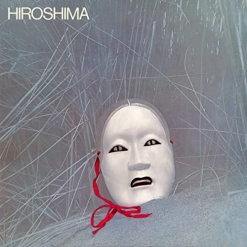Hiroshima’s eponymously titled first album surfaced in 1979 and sold more than 100,000 copies in its first three months. It's an Asian American fusion band that defies categorization as it integrates jazz, R&B, and Latin rhythms with Japanese traditional instrumentation, particularly the koto, which defines its sound and identity.
Named after the Japanese city of
Hiroshima, which was destroyed by the first dropping of the atomic bomb by the U.S. and that killed over 90,000 to 166,000 human beings, the band’s emergence in 1974 was tied to the movements for ‘self-determination’ and recognition, and in solidarity with the greater social movements that engulfed this country in the late 60’s and early 70’s. Their appearances were always enthusiastically welcomed in Asian American communities on the West and East Coasts. They did not land their first recording contract until 1979 with Arista Records. While the band was signed by an enthused African American talent executive, they hit a wall of skepticism and racism within other sections of the record company itself. Executives doubted the viability of the music and just dissed them with commentary along the lines of “Asians don’t sing or dance,” and "their name is a detriment (
www.hiroshimamusic.com).”
How were they able to sell 100k records in its first three months without the validation and support from their record company?
Hiroshima’s founder and leader, Dan Kuramoto, explains, “In our first three months we sold over 100,000 records. How?
Black Radio [my emphasis]. We were embraced for our music and our message and Black radio did NOT discriminate against us. [Black music stations and DJ’s] started to play us constantly. And an audience grew. And our Asian community, who listened predominantly to Black Radio, gave us unbelievable support.”
This band’s first album, as far as I am concerned, is a result of a struggle for human rights (and against racism and discrimination) by a social movement that produced Asian American and Ethnic Studies in several university campuses on the West Coast through student lead strikes at San Francisco State and UC Berkeley. Sounds too rough? Read on...
Hiroshima is really a musical gem that captures with muscular high energy syncopation with several songs, and then with some rich easy-listening vocals. All with the koto’s and shakuhachi’s (Japanese flute) omnipresence.
Things take off with
Lion Dance, an energetic introduction with taiko drums, and followed by
Roomful of Mirrors by female vocals.
Kokoro is a mellow smooth jazz/easy listening thang that has played in more than one wedding ceremonial walk that I’ve been present.
Long Time Love with soulful male vocals about his lament and anticipation by “sleeping with the lights on.”
Da-Da allows June Kuramoto to really showcase the versatility of the koto with electronic orchestration and blues-infused guitar work. Really something.
Never, Ever and
Holidays are easy listening vocal delights. Yes, you did hear steel drums on "Holidays."
The album closes with the anthem-like and toe-tapping
Taiko Song. If you aren’t familiar with the Japanese taiko drum, this can be another introduction to this barrel-shaped traditional percussion. Enjoy!
Hiroshima has been active through all the past 40 years. They followed their debut album with
Odori in 1980, then
Third Generation (1983),
Another Place (1985), and many more thereafter. Go to their website or allmusic.com for a compendium of all their music. On January 4, 2022,
Rafu Shimpo, the Japanese American daily, announced that they will be slowing down.
Find the story and interview here.

